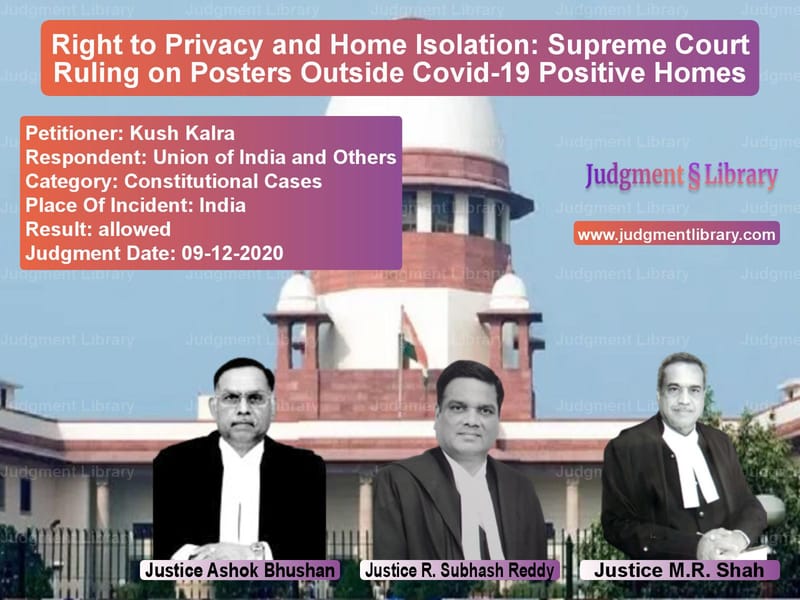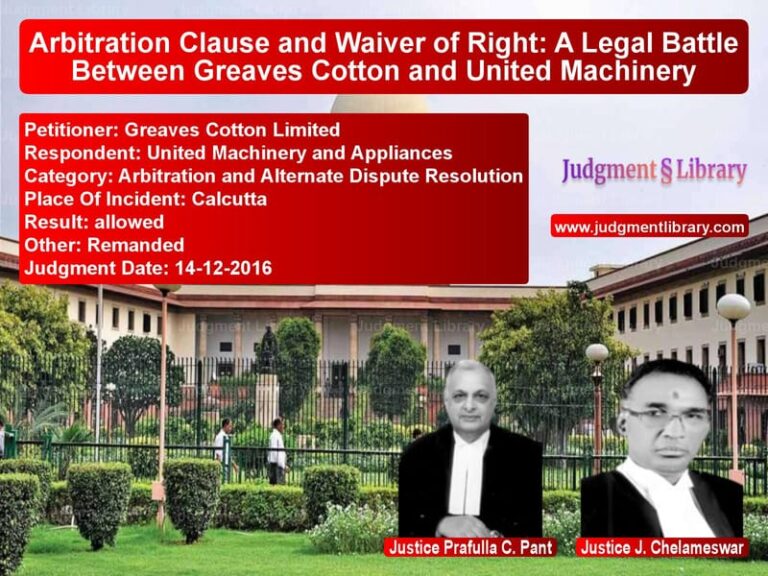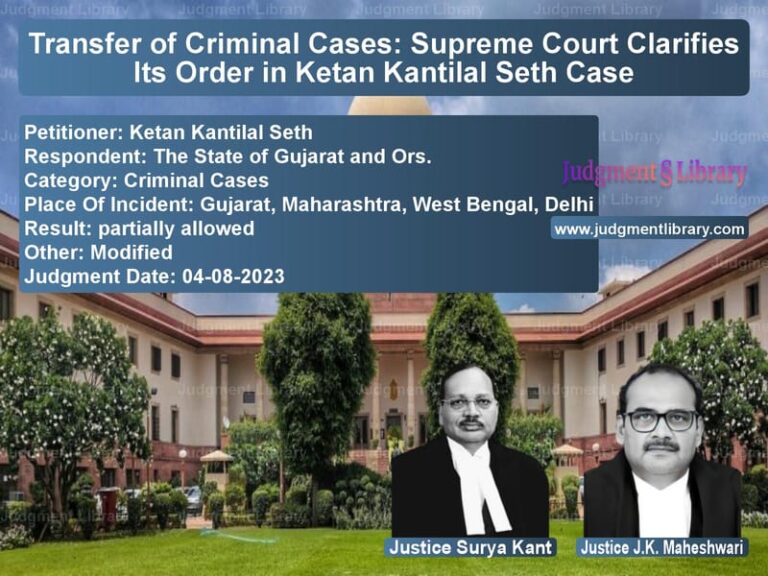Right to Privacy and Home Isolation: Supreme Court Ruling on Posters Outside Covid-19 Positive Homes
This case addresses a writ petition filed under Article 32 of the Indian Constitution, concerning the practice of affixing posters outside the residences of individuals who have tested positive for COVID-19 and are under home isolation. The petitioner, Kush Kalra, sought to challenge this practice, arguing that it violates fundamental rights, particularly the right to privacy, dignity, and the prohibition of discrimination under the Constitution. The case raises important questions about privacy rights during a pandemic and the balance between public health and individual freedoms.
Background of the Case
The petitioner in this case challenged the decision of various States and Union Territories, including authorities at the local level, to affix posters outside the homes of individuals diagnosed with COVID-19. These posters were intended to inform the community that someone in the household was under home isolation. The petitioner argued that this practice violated the privacy of these individuals and subjected them to public scrutiny, causing undue embarrassment and social stigma.
In addition to the posters, the petitioner also sought to stop the circulation of names of COVID-19 positive individuals within resident welfare associations, neighborhood groups, and other community forums, which further led to the stigmatization and discrimination of those affected by the virus. The petitioner contended that this public disclosure was not only a violation of privacy but also unconstitutional, as it discriminated against individuals based on their health condition.
Petitioner’s Arguments
The petitioner presented the following key arguments:
- Violation of Right to Privacy: The petitioner argued that affixing posters outside residences of COVID-19 positive individuals constitutes a violation of their fundamental right to privacy guaranteed under Article 21 of the Indian Constitution. The petitioner cited the landmark judgment in Justice K. S. Puttaswamy (Retd.) vs. Union of India (2017), which affirmed the right to privacy as a fundamental right.
- Inhuman and Indignifying Treatment: The petitioner highlighted that individuals under home isolation were subjected to public humiliation and social embarrassment due to the posters. Their private medical condition became the subject of gossip, which severely impacted their dignity.
- Discrimination and Unequal Treatment: The petitioner emphasized that individuals with COVID-19 should not be discriminated against or treated differently from others merely because of their illness. They argued that such treatment violated Article 14, which ensures equality before the law.
- Unnecessary Publicity: The petitioner pointed out that the practice of affixing posters had become counterproductive. It led to people avoiding testing for COVID-19 to avoid the stigma associated with being labeled as COVID-19 positive. This, in turn, hindered efforts to control the spread of the virus.
Respondent’s Arguments
The respondents, including the Union of India, argued that there were no specific guidelines issued by the Ministry of Health and Family Welfare that mandated the posting of such posters. The following points were made by the respondents:
- Lack of Official Guidelines: The Solicitor General for the Union of India submitted that the Ministry of Health and Family Welfare had not issued any guidelines or instructions regarding the affixing of posters outside residences of COVID-19 positive individuals. The respondents contended that the practice was not officially sanctioned and was not a requirement under the existing health guidelines for home isolation.
- Government’s Position: The Government argued that no such practice should have been implemented by the States or Union Territories without formal guidelines. They referred to a D.O. letter dated 19.11.2020, which clarified that no such practice of posting posters was required under the guidelines issued by the Ministry of Health and Family Welfare.
- Withdrawal of Orders: The respondents also pointed out that several States, including Punjab and Delhi, had already withdrawn orders related to affixing posters after it was brought to their attention that such practices were causing harm and were not in line with public health guidelines.
Supreme Court’s Analysis
The Supreme Court thoroughly examined the issue at hand, considering the following key points:
- Right to Privacy and Dignity: The Court emphasized that the right to privacy is a fundamental right under Article 21 of the Constitution. It noted that the practice of affixing posters outside the homes of COVID-19 positive individuals was an unjustified violation of this right. The Court also recognized the importance of an individual’s dignity, which is compromised when personal medical information is publicly disclosed.
- Public Health vs. Individual Rights: While acknowledging the importance of public health during the pandemic, the Court balanced this with the protection of individual rights. It recognized that the stigma associated with COVID-19 could have detrimental effects on mental health and societal relations.
- Legal Precedents: The Court cited previous judgments that recognized the importance of privacy and dignity, particularly in the context of personal health information. The Court also noted that public health measures must not infringe upon basic rights unless absolutely necessary and justified by law.
- Withdrawal of Practice: The Court took note of the fact that the practice of affixing posters had already been withdrawn by some States and Union Territories, further supporting the petitioner’s case that the practice was unnecessary and harmful.
Supreme Court’s Judgment
The Supreme Court issued the following directions:
- Quashing the Practice of Affixing Posters: The Court directed that the practice of affixing posters outside the residences of COVID-19 positive individuals be stopped immediately. The Court emphasized that this practice was a violation of privacy and dignity and had no legal basis under the current health guidelines.
- Protection of Privacy: The Court issued a directive to all States and Union Territories to ensure that the names of COVID-19 positive individuals are not publicly disclosed or circulated within community groups, resident welfare associations, or through social media platforms like WhatsApp.
- Guidelines for Home Isolation: The Court reinforced that any guidelines for home isolation should not infringe upon individual rights. It urged the authorities to respect the dignity and privacy of individuals while ensuring that public health measures are effectively implemented.
Conclusion
This judgment highlights the delicate balance between public health and individual rights, particularly in the context of a global pandemic. The Supreme Court’s decision underscores the importance of respecting the right to privacy and dignity, even during times of public health crises. The ruling has set an important precedent regarding the handling of sensitive personal information and the need for strict adherence to constitutional principles, even when public health is at risk.
Petitioner Name: Kush Kalra.Respondent Name: Union of India and Others.Judgment By: Justice Ashok Bhushan, Justice R. Subhash Reddy, Justice M.R. Shah.Place Of Incident: India.Judgment Date: 09-12-2020.
Don’t miss out on the full details! Download the complete judgment in PDF format below and gain valuable insights instantly!
Download Judgment: Kush Kalra vs Union of India and O Supreme Court of India Judgment Dated 09-12-2020.pdf
Direct Downlaod Judgment: Direct downlaod this Judgment
See all petitions in Fundamental Rights
See all petitions in Public Interest Litigation
See all petitions in Separation of Powers
See all petitions in Judgment by Ashok Bhushan
See all petitions in Judgment by R. Subhash Reddy
See all petitions in Judgment by Mukeshkumar Rasikbhai Shah
See all petitions in allowed
See all petitions in supreme court of India judgments December 2020
See all petitions in 2020 judgments
See all posts in Constitutional Cases Category
See all allowed petitions in Constitutional Cases Category
See all Dismissed petitions in Constitutional Cases Category
See all partially allowed petitions in Constitutional Cases Category







